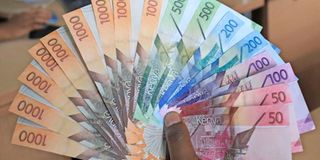Record Sh3.8trn bulk cash transfers on improved business

Kenyan currency notes of different denominations.
Real-time bank cash transfers of more than Sh1 million jumped 18 per cent to hit a record high in May signalling increased cash flow both in the public and private sectors.
The latest data from the Central Bank of Kenya (CBK) shows that bulk transactions through the Kenya Electronic Payment and Settlement System and Real Time Gross Payment System (KEPSS/RTGS) increased to a record high of Sh3.794 trillion last month.
The real-time transfers settled through KEPSS/RTGS are debited and credited to the commercial banks’ accounts held at the CBK, where the banks hold the required cash reserves.
The CBK owns and operates the KEPSS, which went live on July 29, 2005, where it also owns accounts for conducting its own payment operations with banks and other government institutions.
The transactions in May mark an 18.1 per cent jump from Sh3.21 trillion in April.
The volume of the transactions also rose sharply to 698,299 in May – the highest on record - from 564,137 in the previous month.
The apex bank in June 2020 implemented a major upgrade of KEPSS increasing its processing ability to more than one million transactions per day (up from a daily average of 19,000 transactions).
“For Kenyan banks, businesses, and individuals who are the users of the KEPSS, these enhancements will lead to faster, secure, and efficient payments to support the economy,” said the CBK at the time.
As more payments shift to KEPSSS, the average transaction values have dropped from Sh19 million in 2013 to Sh5.3 million in 2021.
Fluctuations
The value of the bulk transactions has been fluctuating in recent months affected by both macro and microeconomic factors.
The CBK in April also migrated KEPSS to new global standards in a bid to boost real-time bulk transactions.
At the same time, the value of mobile payments in May was the highest level since December due to the increased shift to mobile payments.
CBK data shows mobile payments increased to Sh670.44 billion in May – the highest since transactions of Sh708.06 billion in December last year – an increase from Sh615.25 billion in April.
Trends in mobile payments including customer-to-customer payments and customer-to-business transactions often tend to reflect how the economy is performing.
Kenya’s economy is increasingly reliant on mobile payments, especially for shopping and settling utilities, and a drop in mobile transactions often signals a reduction in economic activities during that period.
The CBK recently attributed increased mobile transactions to the accelerated uptake of mobile money transfer services through an increase in the number of active mobile money agents especially in remote areas.
In May, the number of active agents hit a new high of 334,726 up from 329,968 in April, while the number of registered mobile money accounts also grew to 77.34 million from 75.96 million.
“This suggests that entrepreneurs recognized an opportunity in the market to provide cash deposit and withdrawal services in under-served areas, particularly in rural regions where there were limited or no mobile money agents,” said CBK in the 2022 annual bank supervision report.
The government in January reinstated charges on money transfers between bank accounts and mobile money wallets which impacted mobile transactions.
The CBK had in March 2020 scrapped the charges to ease mobile payments.





